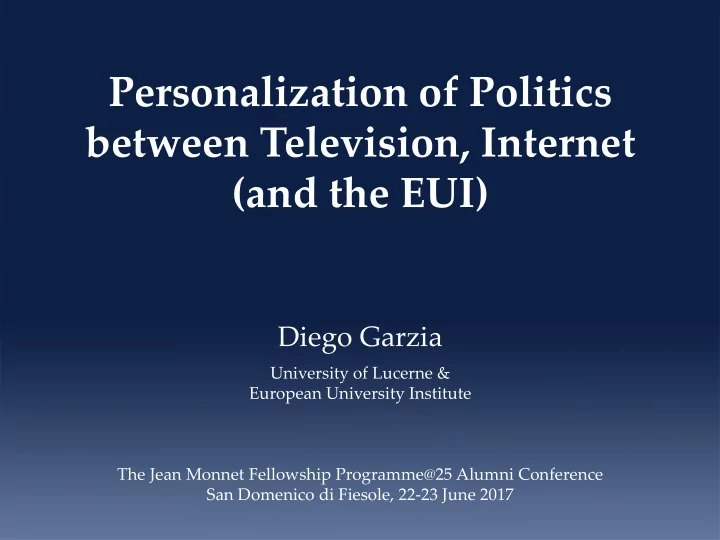

Personalization of Politics between Television, Internet (and the EUI) Diego Garzia University of Lucerne & European University Institute The Jean Monnet Fellowship Programme@25 Alumni Conference San Domenico di Fiesole, 22-23 June 2017
Picture Pagliaiuola
Key Figure from Thesis
Leaders more important to more educated
What will de-personalize politics, if anything?
Voting Advice Applications (VAAs) VAAs are non-partisan online tools developed by NGOs, Universities and/or Media Outlets VAAs help users casting a vote by comparing their policy preferences with those of political parties
The VAA compares the user’s profile with that of each party, and through a matching algorithm provides a voting advice to users
History in a nutshell 1989 Dutch StemWijzer (paper and pencil) First online version: 6.500 users 1998 Success > 2 millions 2002 German version ( Wahl-O-Mat ) 2003
Results from the 2016 VAA Census Source: Voting Advice Applications Research Network http://www.vaa-research.net
Diffusion: Users
Diffusion: Users 50 45 40 Belgium 35 Denmark 30 Finland Germany 25 Greece 20 Netherlands Portugal 15 Switzerland 10 5 0 2003 2004 2005 2006 2007 2008 2009 2010 2011 2012 2013 2014 2015 Source: Respective National Election Studies
Impact on users Information costs Political interest Political knowledge Political participation (mirror function)
Voting Advice Applications and Electoral Participation Civic Voluntarism Model - Information and knowledge as pre-conditions for electoral participation Low-Information Rationality - “Reasoning voters” are expected to minimize information costs - Individuals’ probability to cast a vote is inversely proportional to the effort involved in getting informed Voting Advice Applications Research - VAAs provide cheap information and increase interest in and knowledge of political matters
Impact on users: Turnout increase in predicted probabilities, individual level EU2009 16 DE2013 5,4 DE2009 5,5 NL2012 10 NL2010 4,9 NL2006 2,1 NL2003 1,8 CH2011 12 CH2007 12 FI2011 3,2 FI2007 9 FI2003 9,3
The Italian experiment of 2013 Garzia, Trechsel & De Angelis, 2017 in Political Communication
The Experimental Protocol Field experiment (N~1000) Experimental VAA-platform - Invited accessibility design -ITANES pre/post election survey Response rate: 95%
What next?
What is eu and i? Follow-up to EU Profiler 2009 EU28 24 languages 121 experts in the country teams 242 political parties 30 statements (28+2) 7260 coded and documented party positions IN COLLABORATION WITH THE PARTIES
Pic euandi
The Party Dataset (2009-2014) Garzia, Trechsel & De Sio, 2017 in Party Politics ~ 200 parties coded on the same 18 concrete issue statements Iterative method: Party self-placement (55% cooperation rate) + Expert Judgement Beyond the manifesto: Hierarchy of data sources Inclusion of political parties in the process reduces bias in the case of small/new parties (they know better!) VAAs are always developed in proximity to elections - Reduces the bias inherent to the timing of the study within electoral cycle
The Transnationalization of Europe’s Voting Space Bright, Garzia, Lacey & Trechsel, 2016 in European Union Politics 84% of users are potential party migrants 18% declare that the VAA made them “want to vote for a party in another country”
And then what?
PIC Schifanoia
Thank you!
Recommend
More recommend